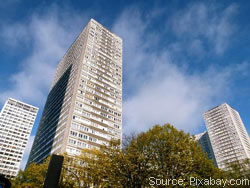With housing prices on the rise once again, apartment rentals have begun to gradually increase due to shifting trends in the moving industry and apartment rental landscape. While the average monthly rent for apartments in many major cities remains high, especially cities like New York, Chicago and Los Angeles, there seems to be a recent gravitation back to renting for many people, as the economy and housing markets slowly begin to recover.
As we head into 2014, what can we expect to see in regards to the economic and lifestyle factors influencing renters the most? Read on to learn more about the current apartment moving trends for 2014.
Economic trends
 According to numbers reported by Reis Inc., the average monthly rent for an apartment in the United States during the fourth quarter of 2013 was $1,083, which happens to be a 3.2 percent increase for the past calendar year. This slight uptick only supports a trend that we've seen unfold for quite some time now--the continually rising rent prices for apartments throughout the country. Despite these increasing prices, people continue to rent with increasing frequency, as studies show that the apartment vacancy rate throughout the nation has decreased by 4.1 percent over that same time period, meaning that apartments are in high demand.
According to numbers reported by Reis Inc., the average monthly rent for an apartment in the United States during the fourth quarter of 2013 was $1,083, which happens to be a 3.2 percent increase for the past calendar year. This slight uptick only supports a trend that we've seen unfold for quite some time now--the continually rising rent prices for apartments throughout the country. Despite these increasing prices, people continue to rent with increasing frequency, as studies show that the apartment vacancy rate throughout the nation has decreased by 4.1 percent over that same time period, meaning that apartments are in high demand.
Why are people moving?
Despite the rising rent costs and falling vacancy rates that the nation has experienced over the last year, what are the driving economic and lifestyle factors leading people to move? Here are some of the current trends that Apartments.com uncovered in their recent survey of 1,500 renters:
- Neighborhood and apartment size are major factors in a renter's decision to move. Among the people surveyed, the two biggest factors that went into a renter's decision to move in 2013 were the neighborhood that the renter currently lived and the size or cost of their current apartment. Almost one-quarter of all people surveyed (24.6 percent) said that they were moving to a less expensive apartment, while 12 percent said that they were moving to a bigger apartment, while another 10 percent wanted to go smaller. On the other hand, 13.6 percent of renters surveyed said that their main motivation for moving was that they wanted to live in a different neighborhood.
- Economic factors are still the main reason behind the majority of apartment moves. These figures highlight one main point: economic factors are still the cause of most apartment moves in 2013. The trend will likely continue in 2014, especially with the continued rising cost of rent in many cities and the decreasing availability of apartments.
- Lifestyle factors play a big part in wanting to move. Aside from the economic factors like cost of rent, lifestyle changes can affect moving. For example, a change in marital status accounted for 11.6 percent of the people who were surveyed, while another handful of respondents said that their reason for moving was to move out on their own, leaving behind roommates or partners and going solo.
Why aren't people moving?
Just because more people are on the move and apartment vacancy rates have dropped over the past year, doesn't mean that everybody is moving. However, there are just as many reasons why people aren't moving --and most of them stem from similar economic factors like affordability and availability. Here are some of the top reasons why people didn't move in 2013, according to the survey done by Apartments.com:
 They simply could not afford to. With unemployment still a major problem in many parts of the nation and average rent costs continuing to rise in major cities, it's not a surprise that many people simply cannot afford to move. Almost half of the people surveyed who did not move in the past year (47.3 percent) claimed that the reason they stayed put is because they could not afford moving.
They simply could not afford to. With unemployment still a major problem in many parts of the nation and average rent costs continuing to rise in major cities, it's not a surprise that many people simply cannot afford to move. Almost half of the people surveyed who did not move in the past year (47.3 percent) claimed that the reason they stayed put is because they could not afford moving.
- They are content with where they are. Of course this seems like an obvious reason, but 40.8 percent of the people surveyed said that they were perfectly fine with their current apartment building and neighborhood and had no desire to move.
- Job security and a sense of stability is an important factor as well. According to the survey, 22.5 percent of people polled cited job security as a reason why they did not want to move last year. The sense of stability that comes from staying in one place with a steady job and friendly neighbors (12.4 percent) is an important factor.
From homeowners to renters
One of the more surprising statistics from the survey was that 44.1 percent of all renters surveyed previously owned a home, up from 35.1 percent in 2013 and 33.6 percent in 2012. This means more people are turning away from homeownership and towards renting. Although 54 percent claimed to prefer owning a home over the 46 percent who said that they preferred renting, here are the most popular reasons given by those who prefer renting:
- No need to make repairs (59.9 percent)
- No need to do any maintenance, including lawn maintenance, snow removal, etc. (51.4 percent)
- Not bound by a mortgage and free to move as frequently as necessary (51.3 percent)
As for why more people are choosing to rent over buying a home, the reasons include:
- Not being able to afford homeownership
- Increased flexibility of choosing where to live that comes with renting
- Needed to relocate for a job
- Other unexpected life events like losing a home to foreclosure or getting divorced